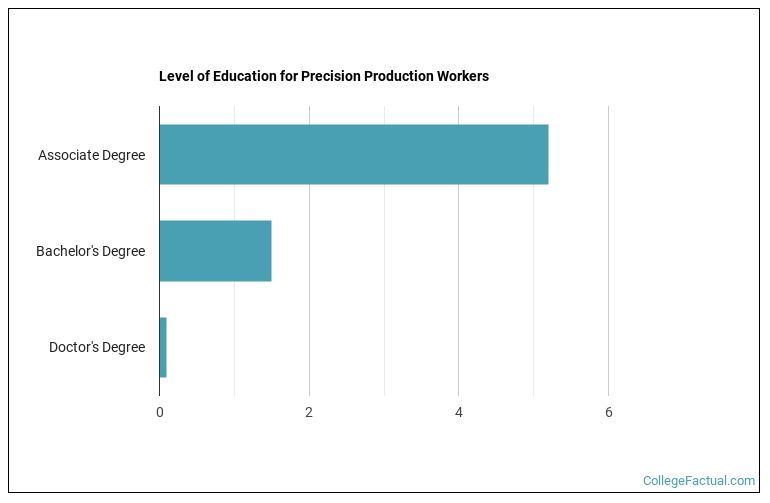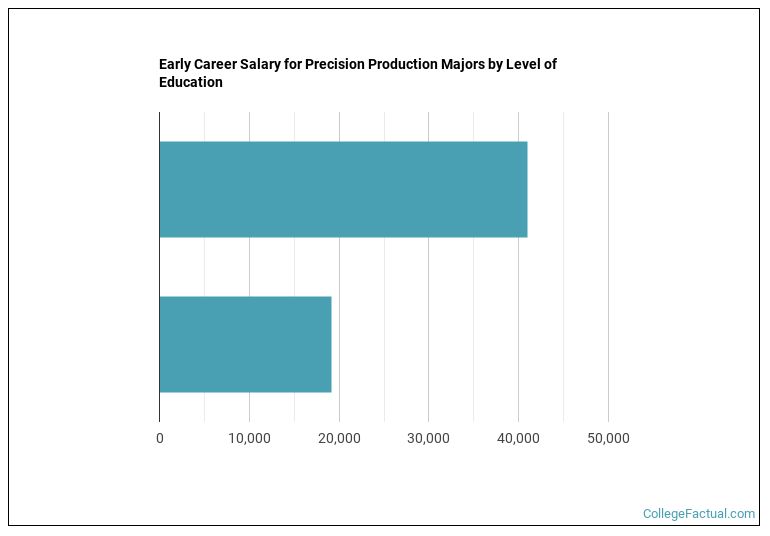 by our College Data Analytics Team
by our College Data Analytics TeamAre you interested in the field of manufacturing and love to build things? Precision Production could be the field for you. Whether you like working with metal, wood, or leather, this major is for any type of craftsman.
A program in Precision Production will provide students with the technical knowledge and skill to develop products using precision manufacturing and illustration. The two main majors in the field are Precision Metal Working and Woodworking. Some of the courses you can expect to take are drawing digital design course, welding, tool-and-die making, and furniture design. This program is commonly seen as a certification or Associate's degree.
Precision Production was the 36th most popular major in the 2021-2022 school year. Colleges in the United States reported awarding 55,411 degrees in this year alone. Our 2025 Best Precision Production Schools ranking analyzes 76 of these schools to determine the best overall colleges for precision production students. Continue reading to check out one of our many unbiased rankings of precision production programs later in this article.
Students who go into this field should be comfortable with basic math, geometry and computer skills. You will be constantly measuring items and need to be careful with details. Problem solving skills will help you resolve complications in projects.
Because this is a hands-on job, it requires physical strength and stamina. You will be working on-site, lifting heavy materials and working long hours. Apprenticeships make up part of most of these programs. Students are paired up with professionals in the field to learn while doing.
New students will need to have completed high school or a GED program and each school will have their own minimum GPA and SAT/ACT test requirements. Once you obtain your degree, additional precision production certifications required to pursue a career in this field.
There are various different levels of precision production degrees. You can get anything from a in precision production to the highest precision production degree, a . How long it takes to complete some common precision production degree levels is shown below.
| Degree | Credit Requirements | Typical Program Length |
|---|---|---|
| Associate Degree | 60-70 credits | 2 years |
| Bachelor’s Degree | 120 credits | 4 years |
| Master’s Degree | 50-70 credits | 1-3 years |
| Doctorate | Program required coursework including thesis or dissertation | At least 4 years |
An associate degree is the most common level of education achieved by those in careers related to precision production, with approximately 3.7% of workers getting one. See the the most common levels of education for precision production workers below.
| Level of Education | Percentage of Workers |
|---|---|
| High School Diploma | 52.0% |
| Post-Secondary Certificate | 22.1% |
| Less than a High School Diploma | 13.5% |
| Some College Courses | 7.3% |
| Associate’s Degree (or other 2-year degree) | 3.7% |
View the chart below to get an idea of what degree level most of those in precision production careers have.

The education level required is different depending on the precision production career you are seeking.
Your career options will be determined by what concentration you chose. Graduates of Precision Metal Working can find jobs as structural iron and steel workers, welders, cutters, solderers, and brazers, sheet metal workers, machinist, and tool and die maker. These are professionals who link metal parts and use hand-held welding equipment to fill indentions or holes of metal products.
Woodworking majors become woodworkers, carpenters, construction laborers and helpers, and construction managers. Construction laborers and helpers do basic tasks on the construction site that required physical labor. Theses professionals commonly work fulltime, although bad weather can affect working conditions.
Want a job when you graduate with your precision production degree?
The following options are some of the most in-demand careers related to precision production.
| Occupation Name | Projected Jobs | Expected Growth |
|---|---|---|
| Welders, Cutters, Solderers, and Brazers | 427,300 | 5.6% |
| Machinists | 404,100 | 2.0% |
| Metal and Plastic Cutting, Punching, and Press Machine Setters, Operators, and Tenders | 175,900 | -8.7% |
| Sheet Metal Workers | 150,900 | 8.6% |
| Machine Tool Operators | 147,300 | 1.1% |
Recently graduated precision production students earned an average of $33,599 in <nil>. Earnings can range from as low as $15,982 to as high as $68,852. As you might expect, salaries for precision production graduates vary depending on the level of education that was acquired.

Salaries for precision production graduates can vary widely by the occupation you choose as well. The following table shows the top highest paying careers precision production grads often go into.
| Occupation Name | Median Average Salary |
|---|---|
| Boilermakers | $63,240 |
| Wood Patternmakers | $59,650 |
| Metal and Plastic Model Makers | $56,920 |
| Computer Numerically Controlled Machine Tool Programmers | $56,300 |
| Tool and Die Makers | $53,650 |
With over 3,352 different precision production degree programs to choose from, finding the best fit for you can be a challenge. Fortunately you have come to the right place. We have analyzed all of these schools to come up with hundreds of unbiased precision production school rankings to help you with this.
| Major | Annual Graduates |
|---|---|
| Precision Metal Working | 54,790 |
| Woodworking | 435 |
| Other Precision Production | 67 |
| Leatherworking & Upholstery | 46 |
| Precision Production Trades | 44 |
| Related Major | Annual Graduates |
|---|---|
| Personal & Culinary Services | 149,352 |
| Mechanic & Repair Technologies | 105,741 |
| Construction Trades | 40,802 |
| Transportation & Materials Moving | 33,306 |